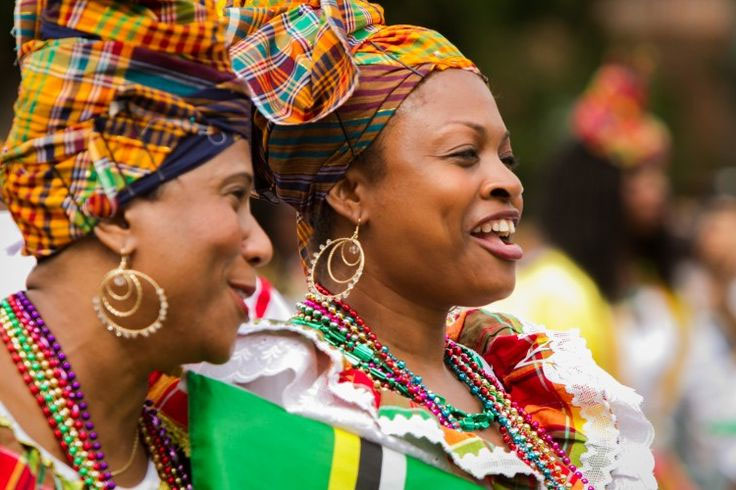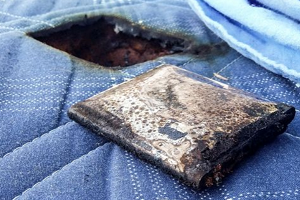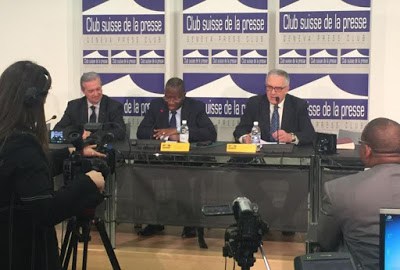Home >>>Arts & Entertainment
The Caribbean Islands Where Indigenes Speak Igbo And Yoruba
By GclefAmplified Dec 18, 2015
 By COSMAS OMEGOH
You may find this incredible, but Igbo and Yoruba languages are widely spoken in the Caribbean Islands. And the speakers are not Nigerians living in those countries. Indigenes of the Caribbean Islands speak Igbo and Yoruba.
It might be different from the Yoruba or Igbo that many Nigerians speak today, but a foremost entertainer and music maestro, Tar Ukoh, says many people in the area speak Igbo and Yoruba of the 13th century. Till now he says, the Yorubas still play and enjoy their traditional Yoruba songs, while the Igbos feature their nmanwu, agaba and ekpe masquerades. Ukoh, known in the entertainment world as Mambisa, made this revelation while on a guided tour with a group of Cuban ladies mostly of Yoruba ancestry now in the country.
They are part of the Cuban troupe searching for the place their ancestors once lived and called their own before they were brutally uprooted by slave raiders and merchants and whisked to sugar plantations in the Caribbean Islands. “This group you are seeing here consists of Yoruba ladies from Cuba.
They are here searching for their ancestral home. They are asking, Ile mi da (where is my home)? And don’t forget that out there in the Caribbean, there are countless Igbos too who still speak their language, feature in agaba, ekpe and nmanwu masquerades. From those masquerades, they fashioned out a brand of music they call Wawanco. Their ancestors too were the exponents of the popular Calypso music which is an adulteration of Ka anyi soo nmanwu (let’s join the masquerade troupe).
They also play another brand of music called Abakwua to remember Abata, a point in Ogoja axis in Cross River through which slaves were taken. Slaves who went through that route were then given numbers such as Abata 1, 2… to identify them.” Now, Ukoh is demanding that those routes and other historical sites like the Long Juju of Arochukwu be revitalised.
He says if that is done, it will boost historical tourism which can become an alternative source of revenue to oil. He is therefore advising that Nigeria should take a cue from countries like Ghana and Senegal that are bountifully reaping from the industry, adding that annually, thousands of tourists stream into both countries to see the Elmina Caste and the House of Slaves on Goree Island respectively where slaves in the 18th century were hounded before their final shipment abroad.
Ukoh who holds citizenships of Cuba and Ethiopia says he is still regretting the alleged Nigeria’s rejection of United Nations Education and Scientific and Cultural Organisation (UNESCO)’s request that slave routes from Isikwuato, Abriba, Arochukwu to Opobo be revitalised to serve as a world heritage site.
“Some time ago, UNESCO approached Nigeria, wanting those routes along which slaves were taken to Opobo be revitalised as a UNESCO project, but Nigeria turned down the request. Countries like Ghana and Senegal then picked the initiative, and now they are making fortune from the project. That is what I’m appealing to Governor Theodore Orji of Abia State to act on. If he could re-establish the Long juju of Arochukwu, the Isikwuato – Abriba slave trade routes, then he can collaborate with Akwa Ibom State to develop the Jaja of Opobo enclave,” he said. Ukoh, who facilitated the coming of the Cuban delegation, told Daily Sun that he was very excited at the collaboration. Describing himself as a Nigerian cultural ambassador, he said he takes much pleasure in marketing Nigeria and Africa to the entire world. “I’m the facilitator and co-ordinator of the project. I brought this cultural troupe to Nigeria.
I’m a citizen of Cuba, by the way. I have been working with Cuba for the past 30 years. What you are seeing today is just an extension of the programme I have been doing in that country. “The Cubans arrived here in August and featured in the Osun Osogbo Festival. And since then, they have been touring the country. They will round off their tour after visiting 16 states.” The essence of the tour, he says “is to develop Nigerian-Cuba tie.
Their aim is to promote their Yoruba heritage in Cuba here in Nigeria.” He expressed happiness that “the response we are getting is fantastic. We go to the villages for them to see things for themselves. What we are doing at the moment is part of the initiative to promote Nigerian – Cuban diplomatic relations.” Ukoh, a multi-linguist from Benue State, says he prides himself as Nigerian, Ethiopian and African cultural ambassador. “I represent Ethiopia in Nigeria.
I’m a pan Africanist because I promote Ethiopian culture in Africa and they see me as their son and that is important to me. In the same way, I’m Nigeria’s cultural ambassador and I see myself as so. That is what I do all over the world. Nigeria gives me that job, that recognition and that is why I’m bringing the Cubans to tour the country. I do that without much help. I don’t need any payment to do that; I see that as my duty.”
He said he works with the Federal Ministry of Culture and Tourism because “they recognise my job all over the world, especially in Africa. So when I bring in programmes, they accept them and often we collaborate. When they have programmes and want to reach out to those countries where they feel I have influence, they always encourage me to have collaboration with them.” He noted that it had become necessary for him to market culture because “culture is everything to me. Without culture, everything is lost. Technology is culture; the food we eat is culture, even understanding how to look after our environment is culture.
Therefore culture is important to our existence. It is not all about singing and dancing; it is the totality of our existence.” The Cuban troupe to Nigeria consists of a team leader, Comrade Karina Palaciuos, a manager and a television journalist said to be the best in Cuba, (both of them males) and then seven women whose ages averaged 25 years. The group has been around since August, 24 2012, when this year’s edition of Osun Osogbo was held. Guided by Ukoh, the group has since been touring some states in the country, interacting with the people and getting used to the Nigerian way of life. The group called Obirin Bata (Women playing the Bata drum, in Yoruba) was at the last Osun Osogbo Festival, drumming and dancing, wining and dining.
Looking at the women, nothing suggests that they are Nigerians, let alone Yoruba. Most of them look alike, except the troupe leader, Comrade Palacious. However, in their midst is a Fulani lady whose look is totally Fulani. All but Comrade Palacious speak Spanish; but they claim to speak Yoruba of the 13th century which might be lost to today’s speakers of the language. “We are here in Nigeria at the instance of the Ministry of Culture of Cuba and Ministry of Culture, Orientation and Tourism of Nigeria,” says Comrade Palacious. “We signed an agreement to develop cultural interaction. We are bringing our culture back to our motherland Africa. So we are back to our roots. Our mission here is to visit different states and see as many places as possible.
“We are excited to be back to our roots. We have been to Osun Osogbo Festival and participated in the international event. We were at the Osun River; we shared with the people in all that they did. In Cuba, we observe the same tradition like the Osun Osogbo. Our cultural troupe is called Obirin Bata which I’m told translates to women playing the drum. “We are very excited to be here. Let me tell you, our country was once a colony of Spain. When the Spanish arrived Cuba, majority of the local Cubans had died and disappeared. Then slaves from Africa started arriving, most of them coming from the Yoruba speaking people of Nigeria.
That is why when you get to streets in Cuba, you see Yoruba speaking people. Now 500 years after, we are back here. “Indeed, I like this cultural visit. With the help of the Ministry of Culture of both countries, I look forward to seeing that a cultural exchange programme between Cuba and Nigeria is implemented. We would like to see Nigerians go to Cuba and have a rewarding experience just as we are having here,” she added.
http://sunnewsonline.com/new/incredible-in-the-caribbean-islands-indigenes-speak-igbo-yoruba/
 | 2358 | |
|
 GclefAmplified
GclefAmplified

 About GclefAmplified
About GclefAmplified











